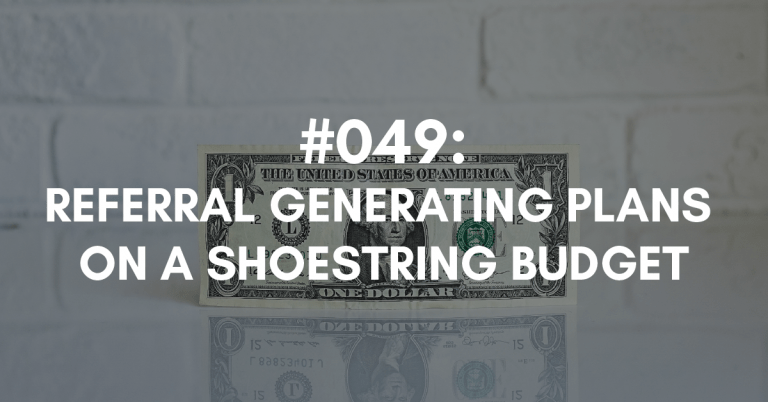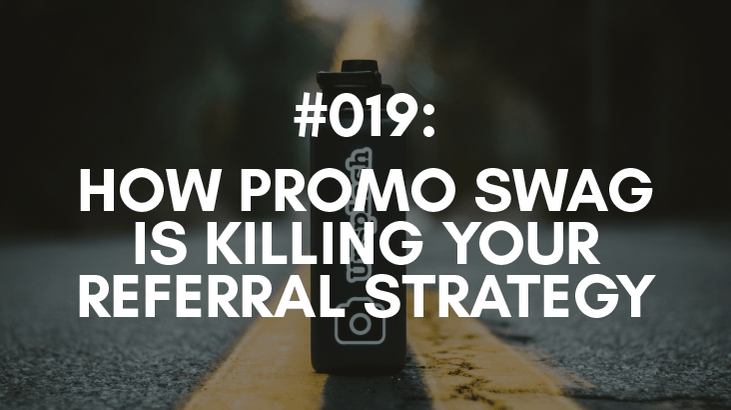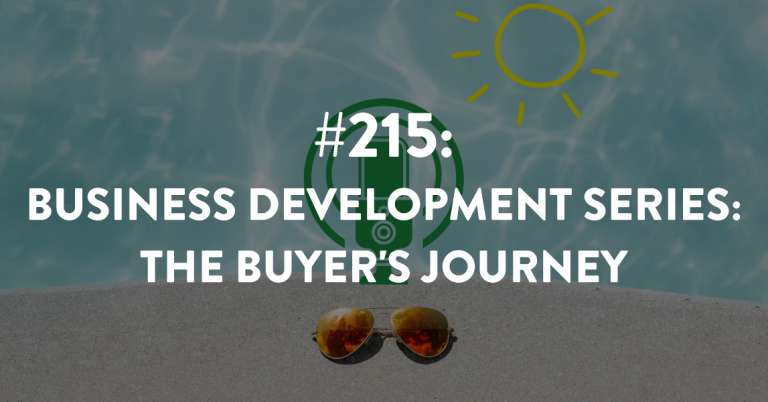Ep #299: The Tension Between Referrals and Control
In this episode, we dive into a topic that many business owners grapple with – the tension between what we can and can’t control when it comes to referrals.
Here are the three main takeaways from this episode:
Desire and Opportunity: Referrals are not about asking for them or providing incentives. To truly understand referrals, we need to recognize the two key factors at play – desire and opportunity. While you can control the desire of your referral sources to refer to you, you cannot control the opportunities they come across.
Selecting the Right Referral Sources: It’s essential to identify and nurture relationships with referral sources who have the opportunity to come across prospects who would benefit from your services. Focusing on those who swim upstream from you can increase the likelihood of receiving quality referrals from sources who truly understand your value.
Cultivating Referral Relationships: Not all clients will refer you, and that’s okay. By nurturing relationships with those who do refer you and selecting the best referral sources, you can enhance your referral network and increase the chances of receiving valuable referrals. Remember, it’s about quality over quantity when it comes to referrals.
By focusing on what you can control and leveraging it effectively, you can maximize the potential for referrals to drive growth and success in your business.
Links Mentioned During the Episode:
Learn how to work with me inside my Building a Referable Business™ coaching program. Check out the program and then apply to see if you’re a fit.
Want me to build your Referral Strategy for you? Then check out my VIP Referrals In A Day service where I handle the heavy lifting for you. First step is to apply to see if you’re a fit and then we’ll schedule a call. (*A minimum of a 2-person team is required for this Done-For-You service.)
Next Episode:
Next episode is #300, which is another episode created with you and your needs in mind.
Download The Full Episode Transcript
Read the Transcript Below:
Stacey Brown Randall: There’s a tension that exists when I talk about referrals. Some would have you believe it doesn’t exist. Others would have you believe that you can’t overcome it. What is this tension? Let’s talk about it.
Hey there, and welcome to episode 299 of the Roadmap to Referrals podcast, a show about helping you build a referable business. I’m your host, Stacey Brown Randall. My journey from a business failure to a successful business now 10 years in, I know generating referrals naturally and consistently has made all the difference. Working with clients around the world, we leverage the science of referrals, protect relationships above all else, and help you build a referral business.
As business owners, I believe that we stand with both of our feet in two different sides of the fence or in two different camps. We have one foot firmly planted in the uncontrollable side, all the things we cannot control. And then on the other side of the fence or in the other camp, our other foot is firmly planted on the control side, the things that we can do and that we can exert control over.
It’s like a ying and a yang, right? We appreciate what we can control. I said appreciate, doesn’t mean we always love what we can control, right? Like those systems and processes. We appreciate what we can control.
But we recognize, of course, right? We’re smart business owners. There is a lot we don’t control. And we know this. We know this at our very core that there are things we just don’t control, but still so many go looking for that strategy or that new tactic that can be controlled and give you the desired results that you either want or someone has promised you.
When it comes to referrals, the old school tactics that we’ve been taught has provided the impression that you can control referrals. You can control referrals if you will ask for them to get them. You can control referrals if you will provide incentives for them so that you can receive them. You can control referrals if you add that gimmicky line to your email signature, the greatest compliment you can give me is a referral, and that will then trigger referrals.
It would have been nice, I guess, if it had actually worked. But they only work for a very small minority. And this podcast episode is not about going in to what sometimes make asking and paying and gimmicky overly promotional things work for people when it comes to referrals. We’re going to save that soapbox for another day.
But of course, there are people, let’s be honest, I don’t know them. But you, and you may not know them or maybe you know them and you steer clear of them, where they’re just not afraid to walk up to anybody at a networking event, get into a conversation with them, press their business card or five of them into the palm of their hand and be like, hey, if you know anybody who’s looking for fill in the blank, whatever it is that they do, here’s some of my cards that you can hand out.
There are people who have like no qualms about that, like all day, every day, that’s what they do. Now, whether or not those things work, we know they don’t, right? It’s why you’re here. It’s why you listen to a podcast called Roadmap to Referrals, and my key methodology is about referrals without asking, or manipulation, or incentivizing, or having to be gimmicky and promotional. It’s why you’re here, right?
So for the rest of us, for those of us that are here that are part of my tribe, that are part of my world, right? For the rest of us who we know better than to believe those old school tactics that you can kind of control everything about referrals, do this and then you will get a referral, right?
We know those things aren’t true. So for the rest of us, let’s talk about what we can control and what we can’t when it comes to referrals. And I believe it is this control that leads to tension.
There’s this tension that I find that when people talk about referrals, and this tension exists between wanting to control everything that they possibly can while recognizing that they know in their heart of hearts or in the back of their head, or actually they just know it, there’s just parts of referrals we can’t control.
And it’s not your fault because there have been people for decades and decades where they will talk about how they controlled referrals. I once read a book with some guy stood on stage and like from the stage, he commanded 200 and something referrals that were just given to him after he walked off stage.
Now, the truth is, there was zero details given about what those 200 and something, quote unquote referrals were. And I’m using air quotes, of course you can’t see. And I was like, yeah, there was zippo detail given as to what those referrals were. So I am always questioning when I read things like that.
Because I know, for somebody who’s been doing this now for 10 years, if we could snap our fingers and referrals would show up, we’d all be doing it. We would all have more referrals than we knew what to do with. And I wouldn’t have a company. Because I’d be doing something else, snapping my fingers, getting referrals for them. Right? So, just because we want it to be true, I guess, right, doesn’t necessarily mean that it is.
And so there is this concept in referrals where people talk about, like, I feel like you’ve got your, your foot is, is like stuck somewhere else. It’s like you believe that you cannot control referrals. You cannot do anything to control them whatsoever. And because you can’t control them, you have zero control of referrals. You’ve just got to be happy when they show up. You’ve just got to hope that you do great work. And then people decide that they want to refer you.
And then on the other side, I feel like there’s people who are like, well, there’s these old school tactics like asking and incentivizing and stuff, but they don’t really work. So I’m either left with hope strategy or I’m left with things I won’t do. So that leaves me kind of nowhere when it comes to referrals. And so it creates this tension. There’s this tension where we want to control everything, and we can’t.
So let’s talk about what we control with referrals and what we don’t. So it takes two things for a referral to happen. And I believe these are the two things that people overlook, and they just don’t acknowledge. I rarely see it when I see other experts talking about referrals. They’re acting, either they don’t know this exists or they’re acting as if it’s not a factor in how we make referrals happen.
And that means, of course, that we’re doing something to our own detriment. with these two factors, these two parts of what it really looks like when it comes to referrals. So these two key things you’ve got to have with referrals. Here they are.
Hey there, pardon the interruption. Did I just completely interrupt and leave a little bit of a cliffhanger within the episode? Sorry about that. We’ll get right back to the episode in just a moment. But I want to take just a few seconds to remind you that if you want to take control of your referrals differently in 2024, then you need to consider working with me inside my coaching program, Building a Referable Business, or BRB for short.
Now, if you’re sitting there and you’re thinking, I need something more hands-on, well then absolutely, you should probably apply for my VIP Referrals in a Day program. But if you’re looking for something where you can go at your own pace and you can work with the community and have some one-on-one time with me and be able to work with me for an entire year, then the coaching program may be the right place for you.
Just go to StaceyBrownRandall.com/referable to learn about the program and click on the link to submit your application. Whether you want the coaching program or you want the VIP Referrals in a Day, they both start with an application. So submit your application now and then we’ll see if you’re a fit. Okay, back to the episode.
The two variables that you need for a referral to happen are this, desire and opportunity. Desire that you’re the person I refer to when I know someone who needs whatever it is you do.
I could refer to any number of CPAs. I could refer to any number of attorneys. I could refer to any number of interior designers. I could refer to any number of business coaches and marketing consultants. I can refer to any number of people in your given industry. So can most other people as well. So the desire piece is that you were the one I choose to refer to.
The second part is opportunity. Opportunity is actually there being a prospect who has a problem, is clear that they have a problem, and has taken that step in their mind that says, and I’m willing to talk to someone about solving my problem, and quite possibly putting money behind my problem, like actually spending money to solve my problem.
Desire and opportunity. You need both. If you don’t have both, it’s not a real referral. If somebody has the desire to refer to you, but they actually don’t have anybody who has what you do as a need, and they’re still sending you people, they’re just like, leads. And they’re not lukewarm or warm. They’re pretty darn close to cold.
So just because someone has the desire to refer to you, if they are referring to you but they don’t ever come across anybody with any level of opportunity, you know this because it shows up in your business as quality issues. I’ve got this person who’s always referring me, but I can never work with anyone they refer to me because fill in the blank for the reasons why.
Because there’s not the opportunity. And that is really key. And so there’s a lot of people who teach that you can manufacture both. Manufacture the desire to refer to you and most definitely manufacture the opportunity to refer to you. And how you manufacture the opportunity to refer to you is because you ask people.
You stalk their LinkedIn, and you give them 10 names of people you want to be referred to. You pay attention to who they’re connected with. You’re asking them to refer you, right? That’s manufacturing opportunity, which it can’t be manufactured if you want that person that they’re going to send to you to actually be a real potential prospect.
I can have conversations with people all day long, and so can you. And I can tell them, oh, you really need to work with my friend, with my client, with my neighbor, Sarah, who’s an interior designer. But if the person I’m telling them, like, oh my gosh, you got to work with Sarah. She’s amazing. Oh my gosh, you need to work with Claire. She’s amazing.
Or I just hired the most fabulous CPA ever. It’s saving me so much money. You should definitely talk to them. If the person that I’m telling that to doesn’t care, doesn’t have a need, if their spouse does their taxes, right? Or if they already have an interior designer, or if they just don’t ever want one. I’m just using lots of different examples here. It doesn’t matter how much I love your business, if the person I’m talking to doesn’t actually have a need, that’s never gonna turn into a referral.
Now, this is very different. from buzz, like word-of-mouth buzz. And I mean like buzz and like what you see on social media and things may be going viral or maybe not going so viral, right? Like I don’t mean that that’s not a good thing.
Like people talking about your business, people sharing about your business, people posting about your business on social media, all that like branding that happens, all that marketing that happens, right? All that like word of mouth, people pushing it out there or whatever on your behalf, that’s amazing. But those aren’t referrals.
And so when people teach you or they try to tell you that, hey, just do this tactic and you can then control referrals, they’re violating the science behind how referrals actually work. And so there’s this tension I need you to recognize. Desire and opportunity, you control one of them. And the one you control is desire.
For your referral source, who comes across your ideal client, who has opportunity to refer, that they refer to you and only you. Because you’re the person that they have the relationship with that they want to refer to. That’s really important that you recognize.
So this tension that gets created in the marketplace when it comes to people trying to teach people about referrals or have them buy their programs about referrals or read their books about referrals or read their articles or whatever it is about referrals, this tension that gets created is because we are not acknowledging and then we are not teaching from a place that recognizes when a referral is happening, there is desire and opportunity.
And recognizing that you only control the desire of your referral source to refer to you. You do not control, nor can you control, the opportunities they will come across to refer to you.
So ultimately that means you need to be picking people who actually come across people with opportunity, right? You need to be selecting people that you’re going to nurture, selecting people that you are going to cultivate to refer you because they actually have the opportunity to come across prospects who would need to hire you.
I think one of the easiest ways to pay attention to maybe who should be, has the opportunity, let’s leave desire out of it for a second, but like who has the opportunity to refer to you. When you think about who has the opportunity to refer to you, right?
Sometimes I talk about this with my clients as like who swims upstream from you. Meaning who is one step upstream that’s talking to your clients and discovering the pain points that your business solves, that you personally solve, right? But who’s like one stream up above you that’s hearing those things before they get to you or before they figure out that it’s time to come to you.
So a lot of people don’t know this, but I actually, of course, I get a great number of referrals from my clients, which is a godsend, right? We all know that when your clients refer you, that’s a godsend. It’s fabulous. It doesn’t just happen. Let’s be honest, right? I’m doing things to cultivate that, to make that happen, right? I walk my own talk.
But the other place where I get referrals from is actually other business development coaches and consultants. So there was a number of really good business coaches and business development consultants that teach business owners how to go about growing their business. And they teach all kinds of amazing things that I do not teach anything about.
But they also know that they’re experts in all these areas. And then they get to this place where it comes up to be referrals. And they’re like, OK, I can teach you what I know. But the person who’s the expert in it is Stacey. And you probably need to have a conversation with her. And it’s a carve out from what we’re doing.
And so I have other people who come across clients who are working with a business development coach or consultant on purpose to move their business to the next level, to figure out the sales process, to get their prospecting and marketing right. And then when they get to that point where it’s like, OK, now it’s time to talk about referrals, they recognize that’s not my area of expertise, but Stacey can help you.
So who’s swimming upstream from you? That helps you kind of figure out what else exists from an opportunity perspective. But never forget, the only thing you control when it comes to referrals with desire and opportunity is you control the desire for your referral sources to refer to you and not your competitors.
So what you do to cultivate, to nurture, to take care of that relationship with those referral sources is really, really important. And then also picking the right people, right? Picking the best people who have the most opportunity to come across ideal clients is the other way you’re actually going to be able to increase referrals happening. And that’s really important too.
It’s also why not all your clients will always refer you. Not every single client you have will refer you. There will always be a smaller number than you probably prefer of your clients that refer you. That’s not because maybe all your clients don’t have the desire to refer you, but they are not coming across the opportunity.
It doesn’t matter how amazing you are and how much they love working with you. They’re either not putting themselves in a position to where opportunity is happening, or it’s happening, and they just don’t see it. And so sometimes that means there needs to be a little cultivation done. But this is why we don’t always get referrals from everybody we would love to, or that we would like to.
Remember, the tension with referrals of what you control and don’t control. You have to have desire and opportunity for a referral to happen. You only control desire. You don’t control opportunity.
But there are strategies and tactics that you need to have in place so that you can put that opportunity factor in your favor by making sure you’re paying attention to who are the best referral sources for you, and then those who are already referring you, nurturing those relationships as well.
It may not be the perfect, wonderful, easy button advice that you were looking for when it comes to referrals. And everyone’s like, just tell me what to say and give me the script. I’m like, it is so much more than that. But this is one I just felt like we needed to tackle.
Particularly it’s the new year and people were like, okay, well it’s like March by the time you guys are listening to this, but it still feels like the new year on some level. And so I still have people asking those questions and it needs to be addressed. You need to recognize what you control and what you don’t control. Desire and opportunity. You got to know what’s most important when it comes to referrals.
All right, the show notes page for this episode can be found at StaceyBrownRandall.com/299, that is for episode two hundred and ninety-nine. Can you believe it? Next week it’s going to be episode 300. I wonder what I’m cooking up for you. Well, you’re just going to have to tune in to hear it.
So we are back with another great episode next week created with you and your needs in mind. Until then, you know what to do, my friend. Take control of your referrals and build a referable business. Bye for now.







